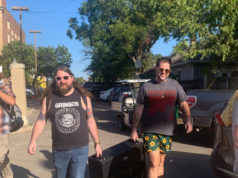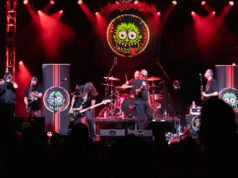There’s nothing wrong with reworking the past. You know a lot of great songs have been written by musicians half-trying to recreate existing great songs. Out now for your pleasure are several themed recordings that have a lot going for them, not least of which is their throwback sensibilities.
The Hendersons’ “Whither, River?” and “Evergreen”
Nolan Robertson has emerged as one of the best songwriters in North Texas, though his name never comes up when talk turns to the subject, probably because he’s not necessarily a man about town. Instead of partying balls at Lola’s or playing cafés and burger joints on the Near Southside and West 7th, Robertson is content to hole up in his Arlington home studio and write, play, and record. And write, play, and record some more. Over the course of about a decade, he’s churned out some of the most mind-meltingly delicious, sun-kissed guitar-based pop ever to come out of the 817, mostly via his band vehicle, The Hendersons. (Hendersons shows are true rarities, but if you follow the scene closely, you might catch one.)
Like the handiwork of Donovan, Cat Stevens, Simon & Garfunkel, and other progressive ’60s-era songsmiths, the gleaming, upbeat surfaces of Robertson’s tunes are often betrayed by his lyrics of death and destruction. On “Golden Days,” a song recorded to a four-track cassette tape in May at The Rockdome in Arlington, Robertson, who plays all of the instruments, couches a suicide tale in the sonic terms of a borderline Elizabethan ditty, with a la-la-LA-la’ing refrain augmented by cheeky, harmonizing organ tones. The song is pretty and, like the best murder ballads, double-edged. This is good stuff.
The young singer-songwriter has just released two new tracks, a dual follow-up to The Hendersons’ spellbinding 2012 album Indian Summer. For “Evergreen” and “Whither, River?” Robertson enlisted some heavy hitters, including drummer Zach Mayo (The Breakfast Machine) and David Wade (Luke Wade & No Civilians), and went from his home to a bona fide studio, The Ninja Cowboy, formerly known as Red Star Recording Studios and now manned by producer Nathan Parnell. Engineered by Parnell and Thomas Mallory and produced by Robertson, the two new tracks are rich, melodic, and, not unexpectedly, eerie.
“Whither, River?” Robertson said, is “a narrator’s stoic reflection on the impermanence of man and the indifference of nature,” which is all fine and good, but “stoic” hardly defines a finger-plucked acoustic waltz with a flute solo and catchy chorus. Juxtapositions of influences might just be what make Robertson’s tunes so unique. On “Evergreen,” Pulp and Blur tango with The Beatles –– the verses, buoyed by a skipping, semi-jazzy snare behind which Robertson wispily sings, lead to a huge, sumptuous chorus, with Robertson pining for a world of never-ending fantasy surrounded by, of course, evergreen trees.
Luminescent and poppy though psychedelic lyrically and at moments, The Hendersons, a.k.a. Nolan Robertson, might just be the best local band you’ve never heard of.
“Whither, River?” and “Evergreen” are streaming at theninjacowboy.com. — A.M.
Ice Eater’s Don’t Care
Fort Worth post-punks Ice Eater pull off a neat trick on their debut album, Don’t Care. Co-written by guitarist Zachary Edwards and drummer Wyatt Adams, the songs start off with an industrial rock groove and gradually turn warmer, or at least more recognizably human, as they progress. “I’ll take my fences down / And turn them into welcome signs” declares lead singer James Jardine on “Flood of Families,” as if inviting audiences to listen deeper than the ambient, droning buzz and sharp percussive pings that serve as the sonic background on many of these tunes.
Producer Alex Bhore sounds like he listened to a lot of Pet Shop Boys before working the boards on Don’t Care, and that’s a compliment –– though sometimes dismissed as ’80s disco revivalists, PSB (at their best) used frosty synths and programmed beats to make pop music with emotional range and insight into human frailty. Ice Eater mines similar territory with tunes like the maddeningly danceable album opener “Without a Blindfold On” and “Scaredycat,” a grungy rocker full of flailing guitars and horn-like synths. “Surfing the Waves of Fun” contrasts layers of cottony background vocals with a distorted, staticky bass line. The galloping closer “Short” resembles a traditional post-punk thrasher, with vocalist Jardine losing his detached-MC cool at the end and raging into the mic. Don’t Care is all about Ice Eater maintaining a very human urgency beneath its vibrant, machine-like elegance. –– J.F.
Doug Funnie’s Metal Gear Solid: The Mixtape
You’ll probably get a bigger laugh parsing the rabbit-hole of metal sub genres –– “blackened thrash” sounds less like a style than it does an entrée at Red Lobster –– but like metal’s most specific niches, nerdcore is for a particular few. Despite the fact that hip-hop (along with country music) has dominated the pop music landscape for nearly 30 years, nerdcore desires widespread appeal. Or not. Most of the time, the music’s only aim is to honor the central tenets of geekentology (video games, comic books, anime, and video games). You could probably write a book on what nerdcore rap says about video games and the multiple generations that have grown up on them, but fuck all that, because when you boil it down to the music, it’s really just about exploring what it’s like to be Solid Snake.
If you had to ask what “a solid snake” is, nerdcore rapper Doug Funnie’s Metal Gear Solid: The Mixtape probably isn’t for you. On the other hand, if you’re even the slightest bit familiar with Konami’s hugely successful 26-year-old video game franchise Metal Gear, Funnie will make you laugh –– or at least remember details about the game, like lead commando Solid Snake’s penchant for sneaking around, his pharmaceutical intake, and the pros and cons of hiding in cardboard boxes.
Funnie spits clever, syncopated rhymes over sampled game music and dialogue, but at the end of it, you kind of wish his songs had something to say beyond the process by which one acquires a fictional, nuclear-armed, walking tank. At the end of “Rex,” for example, there’s a bit of dialogue sampled from Metal Gear 4, in which a minor character goes, “Metal Gear is one of the most secret black projects.” If you’ve never picked up a Playstation controller, you might wonder if there’s some meaning between the lines; sadly, there doesn’t seem to be any. Still, for a nerdcore record, Metal Gear Solid: The Mixtape is pretty tight. You just kinda wish he would have slipped some kind of sly commentary in there, perhaps in the line about stuffing bodies into gym lockers. Doug Funnie isn’t exactly using stealth here, but he still kinda wins. — S.S.













hendersons are by far the best band in town
Doug Funnie’s Snake Eater (Music Video)
http://www.youtube.com/watch?v=-fEQvTzCcQ8
Thank You for the Review!